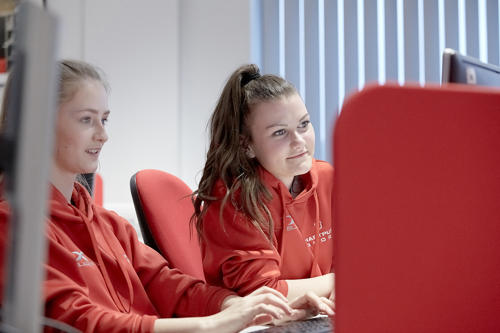Course Overview
Across the two years, this programme offers a variety of practical and theory units to support the students to meet industry requirements. The programme will aim to aid learners in developing their practical skills, knowledge, behaviours and attributes. You will explore a wide range of topics including stable management, scientific laboratory skills and theory based units. In the first year you will learn the core principles of horse care, anatomy, physiology, nutrition and cell function. In the second year you will delve into a deeper understanding equine science including; horse fitness, equine disease, injuries, rehabilitation and metabolism. Learners will also have the opportunity to study for external vocational qualifications through British Horse Society examinations.
There's a range of interesting units to study which are equine and science-related topics, giving you the knowledge and confidence needed to pursue a range of equine careers, including:
Year 1
- Equine Structure Form and Function
- Equine Diet and Nutrition
- Horse Tack, Equipment and Rugs
- Work Experience in the Equine Sector
- Horse Health and Husbandry
- Preparation and Presentation of Competition Disciplines
- Practical Skills in Animal Science
- Equine Function at Cellular Level
Year 2
- Managing Equine Disease
- Horse Fitness
- Managing an Equine Yard
- Equine Injuries and Rehabilitation
- Equine Behaviour
- Metabolism
- Investigative Project
All students have access to all the equine facilities, this includes The Therapy Centre, Rider Performance Suite; including the simulators and all the equine arenas. This course is a mix of both practical and theory teaching. Equitation students ride twice a week and are assessed on their position, riding in the open and riding on the road. You are not assessed on jumping, although there could be opportunities to jump later in the academic year. In both years you will have two hours of practical stable management, which includes all application and fit of tack and equipment, and preparing horses for competition disciplines. Yard duties are completed on a rota basis which are aligned to industry expectations and completed around your timetables sessions, which is why students are expected to be residential. You will also complete an external equine based work placement both years. Learners will be supported by highly qualified lectures, the academic support team and wellbeing.
Learners will be assessed through a variety of assessment methods including; written assignments, presentations, videos, practical tasks, verbal discussions, examinations, online quizzes. Equine has a designated learning support tutor who is available for bespoke academic support and exam arrangements.
Course Overview
Course information
Across the two years, this programme offers a variety of practical and theory units to support the students to meet industry requirements. The programme will aim to aid learners in developing their practical skills, knowledge, behaviours and attributes. You will explore a wide range of topics including stable management, scientific laboratory skills and theory based units. In the first year you will learn the core principles of horse care, anatomy, physiology, nutrition and cell function. In the second year you will delve into a deeper understanding equine science including; horse fitness, equine disease, injuries, rehabilitation and metabolism. Learners will also have the opportunity to study for external vocational qualifications through British Horse Society examinations.
What you’ll learn
There's a range of interesting units to study which are equine and science-related topics, giving you the knowledge and confidence needed to pursue a range of equine careers, including:
Year 1
- Equine Structure Form and Function
- Equine Diet and Nutrition
- Horse Tack, Equipment and Rugs
- Work Experience in the Equine Sector
- Horse Health and Husbandry
- Preparation and Presentation of Competition Disciplines
- Practical Skills in Animal Science
- Equine Function at Cellular Level
Year 2
- Managing Equine Disease
- Horse Fitness
- Managing an Equine Yard
- Equine Injuries and Rehabilitation
- Equine Behaviour
- Metabolism
- Investigative Project
How you’ll learn
All students have access to all the equine facilities, this includes The Therapy Centre, Rider Performance Suite; including the simulators and all the equine arenas. This course is a mix of both practical and theory teaching. Equitation students ride twice a week and are assessed on their position, riding in the open and riding on the road. You are not assessed on jumping, although there could be opportunities to jump later in the academic year. In both years you will have two hours of practical stable management, which includes all application and fit of tack and equipment, and preparing horses for competition disciplines. Yard duties are completed on a rota basis which are aligned to industry expectations and completed around your timetables sessions, which is why students are expected to be residential. You will also complete an external equine based work placement both years. Learners will be supported by highly qualified lectures, the academic support team and wellbeing.
How you’ll be assessed
Learners will be assessed through a variety of assessment methods including; written assignments, presentations, videos, practical tasks, verbal discussions, examinations, online quizzes. Equine has a designated learning support tutor who is available for bespoke academic support and exam arrangements.
To study this course, you’ll need a minimum of six GCSEs at grade 6 or above, this must include English Language, Mathematics, and a Science (Biology, Chemistry or Physics) - if Combined Science has been studied, you'll need a double grade 65.
As part of your application, you’ll need to include a short personal statement. We recommend reading our Personal Statement Guidance to help you include all the right information. You can add your statement when you apply via our Online Application Form.
If we need any additional details to support your application, you may be invited to take part in a short telephone interview with a member of the relevant course team.
If you wish to ride recreationally through the Riding School or Equestrian Club you must complete a riding assessment. For more information, please read our Suitably Mounted Policy. The policy aims to ensure high standards of welfare, health and safety and a positive experience for both riders and horses.
You should expect some small costs for books and stationery. There will also be opportunities to take part in trips related to the topics you are studying. In the past, these have included visits to Alton Towers, the Houses of Parliament, JCB, Uttoxeter, and the Cadbury Factory. These trips incur a charge/are covered by the educational visits fee.
Students are required to pay a non-refundable educational visits fee at enrolment.
All riders are expected to provide their own up to standard riding equipment and small kit list is sent out with joining instructions prior to enrolment. This includes all general riding equipment and a plaiting kit.
How much is livery?
Options for livery can be found here.
Do I have to own my own horse?
No, the college provides horses for you to complete your course.
Can I loan a college horse or compete a college horse?
Unfortunately not, as the college horses are privately owned and only insured in lessons under college instruction.
Can I ride outside my timetabled lessons?
Yes through the college riding school and Equestrian Club.
Can I join the Equine Academy?
Entry criteria for the Equine Academy can be found here.
Is there turnout all year round?
There is turnout on a rota basis and depending on your requirements will limited the turnout availability. The college does their upmost to promote turnout but it does depend on the weather.
How does my own horse fit in with my timetable?
If on duties your horse will need to be cared for prior to you starting your duty morning. Usually you can find time during the college day to ride, as there may be a gap in your timetable. However arenas are open until later in the evening.
How does my external placement work?
Learners will source and organise their own equine based work placement that must meet the college requirements.
What does the college week look like?
Each timetable has approximately 18 hours contact time, excluding duties. This will include classroom based lessons, riding, stable management practical and tutorials. Lessons start at 9.30am and finish at 4.00pm, they have a university feel, no two days are the same and the lessons are spread out throughout the day.
Do I have to do duties?
No, duties are not part of the course.
Do I have to live in?
No, not for this course.
If I pass English and/or Maths can I then do the Foundation Diploma in Equine Management?
Unfortunately not, as the majority of the content is almost identical, except for two units.
Is there an opportunity for learners to study English and/or Maths alongside their course to improve on their grades?
Yes, learners who achieved a Grade 3 or lower at GCSE will be required to attend lessons in these subjects in preparation for sitting exams/assessments at the end of the academic year. Learners will either be entered for Functional Skills or GCSE.
Is it an automatic progression from year 1 to year 2?
Learners must gain a positive tutor reference, demonstrate positive progression in English and/or Maths and gain a minimum of a Merit in year 1.
How much does the course cost?
If you're a UK student under the age of 19 enrolling in full-time A-level courses at Hartpury College, you typically won't need to pay tuition fees. For further information, details for those over 19 year-of-age and international students, visit: Finance | Hartpury College

Outstanding
Rated 'Ofsted Outstanding in all areas' for academic and curriculum-related provision

99.8% pass-rate
With a 99.2% BTEC pass rate (Hartpury College 2025), our outcomes for students are exceptional.

Living in on-site college accommodation at Hartpury, you’ll be part of a vibrant and international community of students of all ages who share their experience of life at college and university together on one campus.

The Hartpury Certificate is an enrichment programme designed to support our students to grow.


A-levels or a diploma?
Are you unsure about whether A-levels or a BTEC Diploma are the right choice for you? Find out the key differences and which qualification would best suit your learning style and your career and further study ambitions on our dedicated page.










